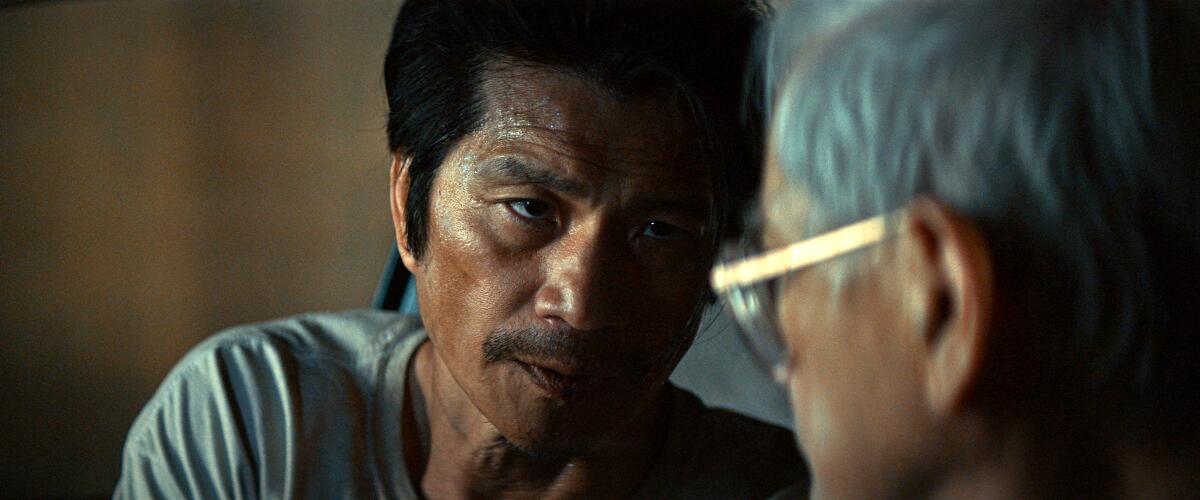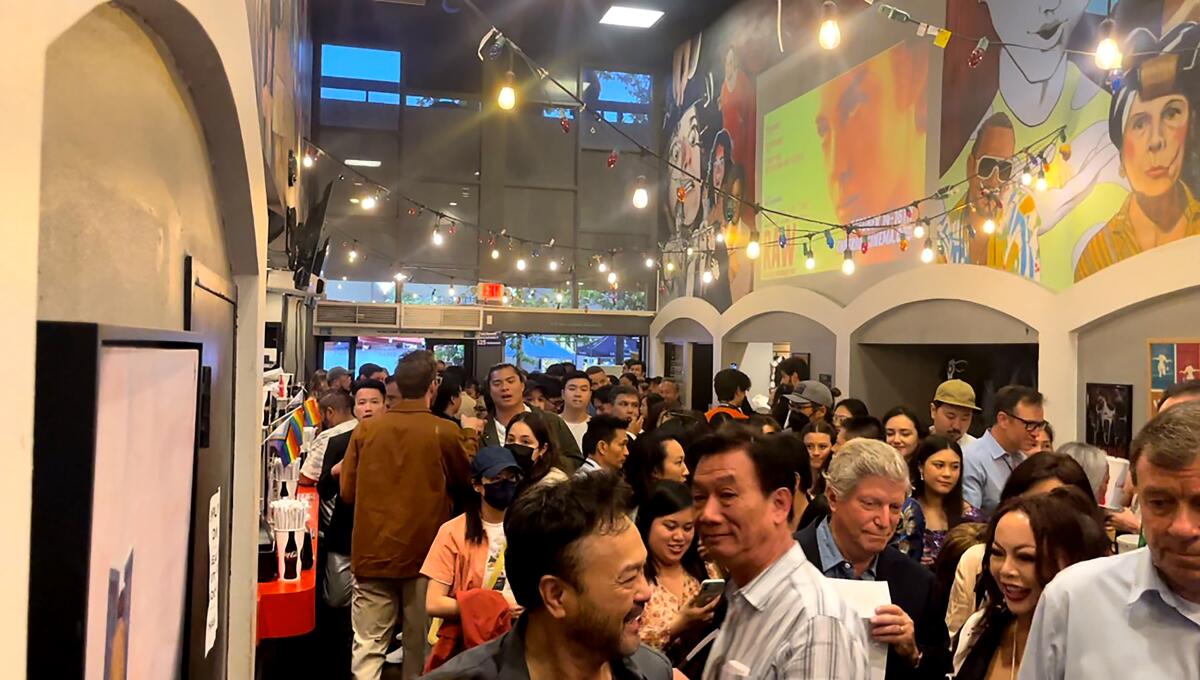‘The Accidental Getaway Driver’ roams into emotional territory. I reported the real thing

- Share via
I remember when I first got the call that three violent prisoners had escaped the Men’s Central Jail in Orange County.
“Is Little Saigon on alert?” the breaking news editor asked about Southern California’s capital of Vietnamese expats. Hossein Nayeri, Jonathan Tieu and Bac Duong were on the loose, and two of them had Vietnamese roots. In January 2016, the area was part of my beat and my editor dispatched me “to go find where they could be, listen to the buzz and ask people for clues.”
Already, the escapees had gotten supplies from a friend, who allowed them to call a private ride service to ferry them to another location in Santa Ana. (In our immigrant district, people use such services because they’re more comfortable with those who speak their language.) The unknowing cabbie waited as they ate noodles. Stomachs full, the men returned, whipped out a gun and according to sheriff’s officials, forced him to navigate north where they stole a van and bought civilian clothes.
And so began my chase from Southern California to Northern California, trailing them by car, plane and foot as they wound their way from stops in the San Gabriel Valley to San Jose to San Francisco, following a well-respected formula for fugitives: Always keep one step ahead of the authorities.
I was quite eager to see their saga unfold in “The Accidental Getaway Driver,” the new movie from Sing J. Lee that screened this month at the Viet Film Fest — and I found both truth and romanticized fiction.

In the opening scenes, cabbie Long Ma (Hiep Tran Nghia) — they kept his real name — leaves home in pajamas and a light jacket, presumably in search of food. His phone rings in the stillness of night. Tay (Dustin Nguyen), Aden (Dali Benssalah) and Eddie (Phi Vu), the convicts here renamed, push for a “quick” ride, Tay insistent when Long refuses after-hours work.
Tension looms in the car after Long Ma picks them up, and swinging by the familiar ABC Supermarket, the driver realizes something isn’t right. Soon, a pistol materializes and the threatened chauffeur is forced to shepherd the men to a motel where the evening news reveals that his passengers have the same faces as fleeing prisoners shown on TV.
In real life, those eight days on the run sparked a statewide manhunt, with SWAT teams conducting raids and combing for leads, and with dozens of law enforcement agencies doubling their efforts. In the movie, there’s none of this frenetic pacing. Much of what the audience sees takes place in temporary lodging or the getaway car as each man struggles with his raging demons — especially Tay, who tries to balance risk and survival while being increasingly sympathetic to Long, whom he doesn’t want to shoot, per orders from Aden, just because “he knows too much.”
The cab driver mumbled as he moved toward the jail visitor’s cubicle in worn sneakers, breathing heavily after sucking down too many cigarettes in the early morning chill.
Eventually, driver and convict would forge a rare bond. Yet before they agreed to call each other father and son, they met as opponents during that fateful ride.
Again, in real life, the police had plenty to worry about: These were men convicted for crimes including attempted murder, robbery and burning a victim with a blowtorch — dousing him with bleach and severing his penis. Authorities warned locals to stay vigilant. CNN, “Good Morning America,” The Times and the cluster of media that encompassed Vietnamese and Spanish-language outlets roamed around the state, reporting the play by play.
One evening, another editor rang me with word that the escapees could be heading for San Jose. The city, apart from Orange County, is home to one of the nation’s largest populations of Vietnamese Americans. The question: Were they hoping to blend in?
I caught the next flight, after making and printing mini-posters with mugshots, urging tipsters to contact us. I scoured churches, restaurants and temples, posting the sheets for help. On a cloudy morning, I raced toward an aging motel, only to miss the escapees’ departure by a few hours. Instead, I interviewed the front-desk clerk, who brought me to their shabby room where cigarette smoke lingered.
Duong escaped again with the cabbie, retracing his steps south to O.C. when the other convicts stepped out to run an errand. He turned himself in to authorities. Police nabbed the remaining two in San Francisco.

Fast-forward to the screening at Santa Ana’s Frida Cinema, when the audience didn’t budge as the credits rolled. They cheered. Many heaped praise on the production, based on GQ’s retelling of the events.
“I feel like this film slowed everything down so we can process, so we can understand what might have happened,” said Kenneth Nguyen, host of “The Vietnamese,” a popular podcast. “When I followed the case in the news, it was happening so fast. I had a lot of questions. The people I know all have a backstory. There is humanity in the crevices of our community. And this shows it.”
Nguyen initially saw the movie at this year’s Sundance Film Festival, where it won Lee, making his feature debut, the directing prize. The podcaster singled out Phi Vu’s portrayal of Eddie, unsure of when to pull the trigger and who’s gripped by the guilt of his crimes. “In the ’80s and ’90s, there were countless Vietnamese refugees who didn’t come to the U.S. with mom and dad,” he said. “Without family, they turned to gangs. That nuance is never captured in films about our experiences, but it’s captured here.”
Another screening attendee, Kim Bui, a Los Angeles resident working in human resources, appreciated the film’s interpersonal nuance. “I loved the back and forth between the young bad guy and the old bad guy,” she said. “They come from completely different generations. They both made big mistakes in their personal lives. Yet it’s like they reached across whatever boundaries there were and they’re connected by a trauma stronger than blood.”
Bui connected the on-screen maturity of Vietnamese American storytelling with the Viet Film Festival’s 20th anniversary, adding: “Maybe 10 years ago, we wouldn’t have this kind of content.”
David Tran, a marketing student from Anaheim, said “a lot of the film is slow. It’s stream of consciousness and flashbacks. I went back and read all about the crazy stuff. You don’t get that sense of movement in the movie, but hey — what a movie. It’s awesome and challenges us to solve part of the mystery.”
My own reaction was a little more complex. It’s great to see an Asian-centric film — a compelling collection of Asians on the screen, especially Dustin Nguyen’s powerful performance. The “21 Jump Street” actor is magnetic in his intensity, smooth in his delivery.
As the cabbie, Vietnamese French actor Hiep Tran Nghia wins over the audience with his alertness and sensitivity. I had tracked down the real-life Long Ma and spent time interviewing him on four separate days. In person, he was more raw, more plain-spoken and way more desperate than the slightly academic version embodied by Hiep.
Lee, in his director’s notes, says he intended to weave “a modern folktale of the forgotten.” The film is a character study with elements of noir. There’s an interplay between light and shadow. And there’s a recurring cynicism when dealing with the legacy of the war. The final product is very polished. The writing is clear. The dialogue is stark. It’s user-friendly, and maybe that’s the Hollywood way.
Some moviegoers like Tran said they’re “glad the film folks” did this one. “The other story is too harsh.”
More to Read
Only good movies
Get the Indie Focus newsletter, Mark Olsen's weekly guide to the world of cinema.
You may occasionally receive promotional content from the Los Angeles Times.











